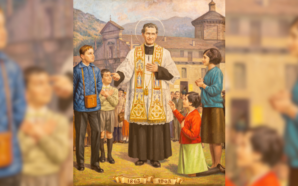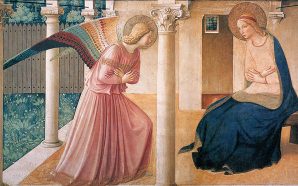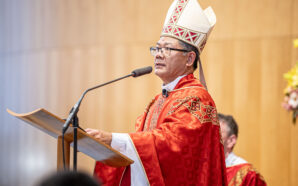Msgr. Tomáš Halík ThD (1948) is a professor of philosophy and sociology of religion at Charles University in Prague and president of the Czech Christian Academy. During the communist era, he worked as a secretly ordained priest in the so-called underground church. He is a recipient of the Templeton Prize and honorary doctorates from the Universities of Oxford and Erfurt. His books have been translated into twenty languages.
I must admit that even in these days when the dangerous virus is killing many people in our country, I personally cannot stop worrying about yet another pandemic, namely, the pandemic of fundamentalism and bigotry. Looking at the Catholic supporters of Donald Trump, I struggle with the intense temptation of scepticism: Is ‘ecumenical dialogue within the Catholic Church’ even possible? I find inter-religious dialogue, and especially dialogue with educated and thoughtful people outside the Church, so much easier than any communication with the people who combine religion with populist and nationalist efforts. For half a century I lived a great dream of uniting all who believe in Christ. Today, for me, this dream is ending in smoke.
There are differences that I regard as insuperable—and these differences are not between the churches but rather across them. I really cannot march under the same banner with people who claim to know that God created the world in six days or that the relics of the Noah’s Ark were excavated on Mount Ararat; people who argue against the ordination of women by pointing out that Jesus did not choose any woman to be his apostle; people who are ignorant to the fact that the acclaimed victory of ‘pro-life’ groups in Poland, the criminalisation of abortion, will encourage ‘abortion tourism’ of Polish women to the Czech Republic and Slovakia, contributing very little to the protection of the unborn and failing to actually stop the evil of abortion. These people also refuse to acknowledge that ‘pro-family’ protests have little to do with the support for families but are in fact directed against the rights of LGBT citizens. For a large number of today’s Christians, the positive content of faith has become emptied. Therefore, they need to found their ‘Christian identity’ on ‘culture wars’ against condoms, abortion, same-sex marriage, etc. Pope Francis has been brave enough to refer to this reduced and negatively defined Catholicism as ‘neurotic obsession.’
I am definitely not going to leave the church where I will continue meeting the people with such views and moral convictions at the one Eucharistic table. I am well aware that I too am a fallible and error-prone human being. Nevertheless, I wrestle with a major doubt: Is it not time to leave behind the ecumenism of ‘all Christians’ and instead to concentrate our energy on deepening a fruitful sharing, synergy, and mutual enrichment among thinking people, both believers and non-believers? Should we go on wasting time and energy on futile attempts to have dialogue with people who become agitated and defensive when the very word ‘dialogue’ is used—even if we can perhaps understand the subjective motivation to their stance?
One of the spokespeople for the Czech Catholic right, a former chairman of their organisation and a fierce campaigner against the European Union who was once nominated for the position of the Minister of Culture of the Czech Republic, named ‘ecumenism and homosexualism’ next to each other on the list of the enemies of the true church in his manifesto a long time ago. Today, people with a similar mindset find support from a certain part of the church hierarchy for their appointments to the boards of the media in our country. In Hungary and Poland, these adherents of ‘illiberal democracy’ (the authoritarian state) are eliminating step by step the freedom and independence of the media, the justice system, non-governmental organisations, and universities.
Yes, we recite the same Lord’s Prayer and Creed together with these people. I do not deny that there are good and honest people among them. However, I fear that we live in unbridgeable parallel universes. Listening to a certain apocalyptic sermon about the depraved world that did not contain the slightest spark of the Gospel, faith, love, and hope and whose author could not be excused by his simple-mindedness, I lost my conviction that I was truly connected through the same religion with the people of such a mindset, although we might formally belong to the same Church. I fully agree with the words of one of the greatest Christian leaders of the 20th century, Cardinal Martini: “I am not so much afraid of people who do not have faith; what disturbs me are people who do not think.” I came to realise, however, that the dividing line between the people who think and those who do not is not at all identical with the difference between the educated and the uneducated; my call is not for an elitist religion of the intellectuals. The difference lies much deeper—in people’s hearts.
It is a joy to be on the same board with people who follow scientific knowledge in all fields where science is competent, while also posing profound ethical and spiritual questions. The path between the religious fundamentalism of a considerable number of Christians and the equally arrogant scientific fundamentalism of militant atheists is often narrow and demanding. I am nevertheless convinced that it is the way to follow Christ today.
We could perhaps still avoid a schism by taking a cue from the Apostolic Council of Jerusalem (Acts 15) and dividing the tasks: let some look after the needs of the believers who long for the certainties of the past, while others would listen to God’s call heard in the ‘signs of the times.’ I often reflect on whether we today might be in the similar situation to that of Paul the Apostle who let James, Peter, and the other venerable apostles continue with their ministry among the conservative Jewish Christians and led the brave young Christianity from the limited space of contemporary Judaism into the then oikoumene—into a completely different cultural context.
Today, Pope Francis perhaps shows us—and not only in Fratelli tutti—an understanding of the Gospel and an attitude to creation and to people, especially those on the margins, that prophetically points to the Christianity of tomorrow. Christian identity is not rooted in immobility but in the movement of the Spirit who works in history to lead Jesus’s disciples deeper and deeper into the fullness of truth. I am not advocating a non-critical cult of the personality and views of Pope Francis. Rather, what I am calling for is a culture of spiritual discernment and fostering of those values that lead both to the heart of the gospel and a courageous and creative response to the ‘signs of the times.’
Reactions to a Papal Statement
Last October, sensational and striking news from the Vatican featured on the front pages of world’s leading newspapers. Looking apart from the form, the core of the message lay in Pope Francis shocking the world by speaking about homosexuals and their entitlement to love in a very humane manner, as a normal 21st century person who is both tender-hearted and has their good head on their shoulders. He spoke as if there had not been long centuries of fear, prejudices, and hatred toward non-heterosexual people – the prejudices that have caused plenty of human tragedies and driven many to suicide. Not so long ago, a number of such tragedies happened in our Czech countryside due to the fear of a conservative Catholic family’s reaction to a teenager’s ‘coming-out.’
This time, the Pope did not content himself with merely referring to the pseudo-progressive but, in fact, hypocritically inconsistent position of the existing church documents that urge us to treat LGBT people ‘sympathetically,’ while, nevertheless, offering homosexual believers life-long sexual abstinence as the only acceptable solution. I will never forget the eyes and voice of a certain gay Catholic intellectual who responded to my words that we could perhaps accept his union as a ‘lesser evil’—the words that I then bona fide regarded as most generous and progressive on my part as a confessor—with a quiet question: “Father, why should I see the life-long relationship of love, fidelity, and mutual support with my partner as evil?” In the subsequent decades I have experienced major surprises realising that the perceptions of a high percentage of gays among the Catholic clergy are not merely malicious gossip spread by the enemies of the church. I have come to know a whole variety of them: from those who lived a life of complete chastity, projecting a kind of delicate and understanding motherliness into their pastoral approach to people, to those who were in a complete denial of their sexual orientation, living a double life and compensating for their inner conflicts as a result of this situation by exercising ultraconservative aggressiveness toward homosexuals. Behind almost all cases of the most zealous campaigners against the ‘tsunami of homosexualism’ I detected experience with the psychotherapeutic practice of a priest who had tried to ‘shout down’ his personal issue.
The decisive matter is not what exactly the pope said in that film; his support for ‘civil unions’ (not ‘marriage’) of LGBT people and a humane approach to them is longstanding and well-known from many of his earlier statements. I have been waiting for a reaction from conservative enemies of Pope Francis to his most recent words. Will there again be new ‘filial corrections’ by a group of conservative theologians and ‘dubia’ (doubts, objections) by some cardinals like previously, when Pope Francis sensitively mentioned in his encyclical Amoris laetitia that not all divorced and remarried persons have to be harshly denied the Eucharist or to observe forced sexual abstinence in their second marriage under all circumstances and for good; but rather that every case needs to be addressed wisely and kindly, taking into consideration also one’s conscience? What these opponents demand from the pope is rigid adherence to the letter of the Law. That is exactly the attitude that Jesus opposed his whole life in his encounters with the religious elites of his time, obliging his disciples to beware of the ‘yeast of the Pharisees.’
I think that the present-day Pharisees are still deliberating about their action. Some bishops were heard to say that the flippant pope simply made a slip of the tongue in front of the camera and that his words have no dogmatic authority. A famous Czech Radio Vatican reporter was quick to come up with the explanation that the pope’s words had been taken out of context and manipulated. ‘Calm down, friends! The pope did not say anything important—nothing has or will ever change from the good old ways!’ That is precisely in line with what a certain Czech prelate told me, in the Vatican, shortly after Pope Francis had been elected: “I was told in the Vatican, ‘Just stay calm and quiet, the pope is old—he will die soon and then everything will be back to how it was!’” Similarly, the curial scribes had been looking for comfort in the age of Pope John before he announced a reform council that would forever change the history of the Catholic Church.
One of our leading Czech church representatives (who has become prone to use the line ‘I have secret information from intelligence services’) has advanced an ad hominem argument connected with a political conspiracy theory: the film director is a homosexual and the film was made to order to influence the upcoming presidential election in the USA.
The Pope does not Reform Dogmas and Statutes but the Life of the Church
Pope Francis is not a revolutionary bent on changing church doctrine. The people who have known him well for decades say that he is not a theological progressive; rather, he is merciful. Mercy is the key to understanding his personality and his reform. This pope does not change written standards, nor does he tear down external structures; however, he transforms praxis and life. He does not change the Church from the outside. Rather, he transforms it far more thoroughly—spiritually, from the inside. He transforms it through the spirit of the Gospel; it is a revolution of mercy. In his case, these words are not mere empty pious phrases. Therefore, his reform has a potential to change the Church and bring it back to the heart of Jesus’s message more profoundly than many reforms of the past. To counter Francis, a pamphlet appeared on the Czech Catholic scene from the ‘owners of the truth,’ with the suggestive title, Mercy without truth? I decided not to respond to the pamphlet, trusting that for the critical reader the very title would immediately evoke the counter-question: Truth without mercy?
The belief that the change of behaviour is more than change of letters of law and structures inspired not only the early church but also, for example, the philosophy of political dissent in the communist era. In Paul’s Letter to Philemon we read a paradigmatic story. The Apostle took care of a runaway slave, baptised him, and is now sending him back to his Christian master with an adjunct that the slave (Onesimus) will continue to serve the master (Philemon). However, Philemon is to remember that Onesimus is now his brother in Christ. Christianity does not recommend a violent revolutionary overthrow of the slavery system in the manner of Spartacus’s rebellion. Rather, it calls for creating a moral climate of human siblinghood and mutual respect for the value of every human being in which the slavery system must eventually breathe its last. Nevertheless, it is necessary to add that the church did very little to follow this stance on slavery in its subsequent history, so that it had to be recalled again and again by such prophetic figures as Bartolomé de las Casas.
I find a certain analogy to this political ethics in the anti-communist dissent, especially the Charter 77 movement in Czechoslovakia. The Charter signatories did not demand a revolutionary overthrow of the communist government in the period of the Soviet occupation (1968–89). Instead, they accompanied a challenge to the government to abide by its own laws (a challenge they very well knew would not be accepted by the government) with another challenge addressed to the citizens to start acting as free people, that is, as if the laws had been in force. Moreover, the Charter signatories served as role models of such behaviour, even though they had to expect intimidation and repression in response. Nevertheless, this example of non-violent moral resistance and alternative behaviour had become a certain ‘school of courage’ that, under the specific economic, foreign-political, and cultural circumstances in the late 1980s, led to mass protests and the quick capitulation of the communist regime with seemingly ‘unbelievable ease.’ It is undoubtedly useful to enumerate a multitude of various influences on the annus mirabilis of 1989 but it would be cynical to forget the fact that many individuals then began, at least for a short time, to behave as truly free people.
Pope Francis does not change dogmas, nor does he challenge even those sections in church documents that represent, as hopefully all of us know, ‘products’ that expired a long time ago and are now poisonous and harmful. Similarly, the Second Vatican Council did not officially annul, for example, the undefendable anathemas of Pius IX against the freedom of conscience, the press, and religion (the Syllabus of Errors). Rather, it issued a binding document (Gaudium et Spes) which turned these values, until then rejected by the Church, into an integral part of the teaching of the Church. Changes in the style of behaviour and pastoral approach (Vatican II intended to be a ‘pastoral council’), however, naturally lead to many structures and official formulations simply ‘waning’ sooner or later.
Through his personal example of Christian bravery, Pope Francis inspires us to be neither intimidated nor discouraged by some occurrences in the Church. Instead, he calls us to act like free children of God, responsibly exercising the freedom to which Christ has liberated us and not submitting again to the ‘yoke of slavery’ of legalistic religion (Gal 5:1).
‘Nothing is going on; everything will stay the same!’ cry the high priests of the church of dead religion. Yes, there is indeed nothing going on that they could entrap Pope Francis for. Francis is no heretic, and neither are those who have accepted his call to spiritual renewal of the Church. It is necessary to continue in this spirit by trusting in the revolutionary power of God’s mercy which is the alpha and the omega of Francis’s theology, even if the Pope himself has lost the power to carry on with the needed reform.
At the beginning of the ‘Year of Mercy’ some of us had some theological doubts as to whether the notion of mercy did not interpret God’s love too much ‘from above.’ However, it became clear why the Pope calls us to mercy through which we invite God into complicated and painful human relationships, not as a guarantor of immutable principles but rather as a kind, generous, understanding, forgiving, and healing power capable of transforming the human heart, the Church, and society.
The horizontal line of ‘human brotherhood’ discussed in the recent encyclical Fratelli tutti needs its vertical complement of love as infinite mercy which goes beyond all humanly conceivable borders; it is the love without boundaries which we can only head toward as the goal that will not be fully realised until we are embraced by God’s arms. Like most of Jesus’s paramount teachings, this ideal must not become a ‘law.’ Rather, it must remain a constantly provoking and prophetically inspiring impulse that no Christian can ever be ‘done’ with.
At the beginning of the pandemic some Christians again tried to play their card of an evil, revengeful god with whom they could frighten those who had already disengaged themselves from the influence of the Church. Fear has always been a fertile soil for the entrepreneurs of false religion. Human pain serves them as an alleged proof of their apocalyptic visions. Like John Paul II, Pope Francis also emphatically repeats Jesus’s words full of hope and strength: “Do not be afraid! Do not let yourselves be intimidated.”
Translated by Pavol Bargár
With thanks to the Association of Catholic Priests, where this article originally appeared.








